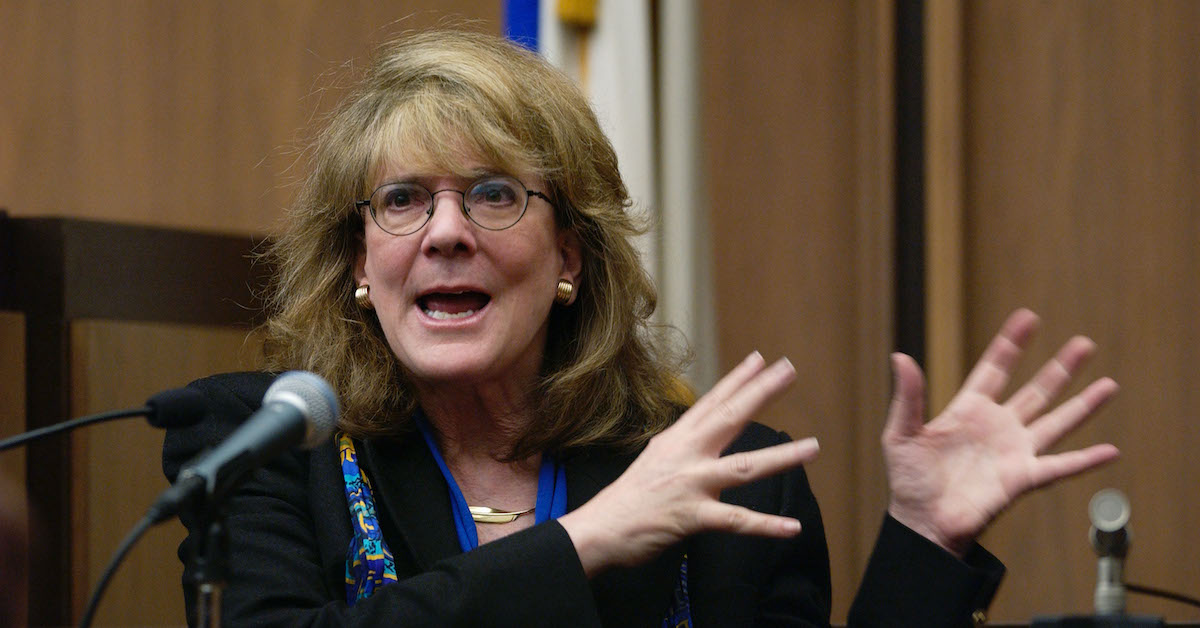
Elizabeth Loftus, an expert in false memories, testifies in Paul Shanley child abuse trial. (Photo by Jodi Hilton/Getty Images)
A “false memory” expert relied upon by Harvey Weinstein, Robert Durst, O.J. Simpson and hundreds of other criminal defendants seeking to undermine the credibility of their accusers testified on behalf of Ghislaine Maxwell, as the accused sex trafficker’s defense case kicked off on Thursday.
Elizabeth Loftus, a psychologist credited by the New Yorker with having “Changed the Meaning of Memory,” was a long anticipated witness for Maxwell, whose defense attorneys requested and received permission for her to testify at trial.
“One thing we know about memory is that it doesn’t work like a recording device,” Loftus told a jury on Thursday, drawing a computerized diagram mapping out three stages of memory: acquisition, retention and retrieval.
Despite having testified in more than 300 trials, Loftus conceded that prosecutors only consulted with her five or six times and asked her to testify once.
“The prosecution is frequently the one that has — is putting on memory testimony and maybe wants to bolster that testimony,” she said. “And the testimony about memory distortion or the potential for false memories is not something that typically fits in their agenda.”
Assistant U.S. Attorney Lara Elizabeth Pomerantz seized upon those statistics during cross-examination, suggesting Loftus made her career and reputation testifying for high-profile criminal defendants. Pomerantz noted that Loftus had written a book titled “Witness for the Defense.”
“You haven’t written a book called ‘Impartial Witness,’ right?” Pomerantz asked, sparking a defense objection.
After the judge overruled, Loftus replied: “I don’t have a book by that title, no.”
Maxwell’s defense team hopes that Loftus’s testimony will undermine the accounts of their client’s alleged victims and accusers.
“Jane,” a soap opera actress, claims Maxwell touched her breasts and groomed her for Jeffrey Epstein at age 14. “Kate,” a British former model, told jurors she was 17 years old when Maxwell coaxed her to give the disgraced financier sexualized “massages.” Carolyn, who testified under her true first name, testified that Maxwell touched her breasts and saw her naked some 30 times in Epstein’s massage room, beginning at the age of 14 years old.
During opening statements, Maxwell’s attorney Bobbi Sternheim framed the case for the jury as one of “memory, manipulation and money,” emphasizing the age of the allegations in her client’s indictment.
“Jane’s” account began in 1994, when she said that she met Epstein and Maxwell at Interlochen, the prestigious arts academy for talented youth in Michigan.
After Maxwell passed by with a “cute little Yorkie,” “Jane” testified, the introduction sparked a follow-up meeting in Palm Beach arranged through the young teen’s mother. “Jane” told jurors that a cycle of sometimes-“painful” and traumatic abuse followed, including so-called “massage” sessions and sexual contact with a back massager used as a vibrator.
Throughout her testimony, Loftus did not comment any of the accusers’ allegations, and she acknowledged that she is not a therapist. She instead spoke about her experiments on the what she described as the general pliability of memory, which she testified was subject to suggestion by the news media and other forms of “post-event suggestion.”
Sternheim sought to preempt accusations as to Loftus’s motive by eliciting on direct examination that the witness is charging $600 per hour for her time, but her payment does not depend upon the outcome of the trial. Pomerantz asked pointed questions about whether her testimony payments that have racked up in the millions over the course of her decades-long career. Loftus replied that she did not know.
When Pomerantz tried to elicit testimony about her work in the Weinstein case, a defense objection moved her testimony to another topic.
During cross-examination, Pomerantz also got Loftus to concede a key point for the prosecution.
“People may forget some of the peripheral details of a trauma event, right?” Pomerantz asked.
“That can happen, yes,” Loftus replied.
“But the core memories of a trauma event remain stronger, right?” the prosecutor prodded.
“I probably agree with that,” Loftus conceded.
Earlier on Thursday, the defense case began with testimony Cimberly Espinosa, who worked for Epstein’s company before 2002. The first defense witness, Espinosa’s testimony was filled with praise for Maxwell, her former boss. She also had fond memories of presents from Epstein, and she said that she never saw either of them behaving inappropriately with minors.
Under short and sharp cross-examination by prosecutors, Espinosa also conceded that she never worked inside any of Epstein’s homes, including his Palm Beach estate.
The second defense witness, Raghu Sud, worked for a company named Shopper’s Travel and authenticated invoices tied to Epstein.
Maxwell’s attorneys did not reveal whether they will call their client to the witness stand. It is unclear how many of their proposed 35 witnesses will testify, and they lost an “unprecedented” request to allow certain witness to take the stand using pseudonyms. By the day’s end, Maxwell’s defense team anticipated they may rest as early as Friday.